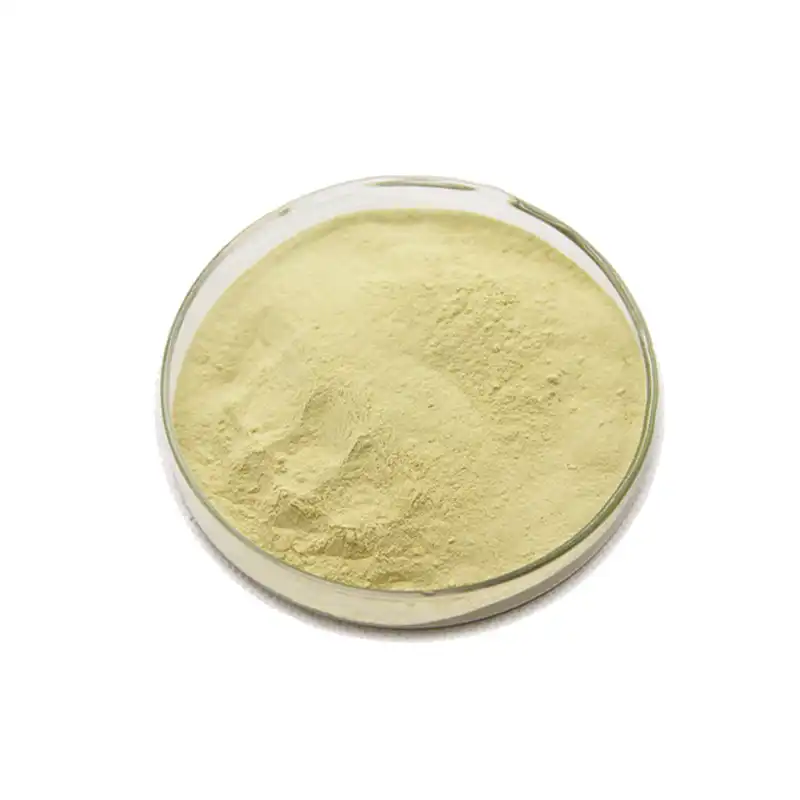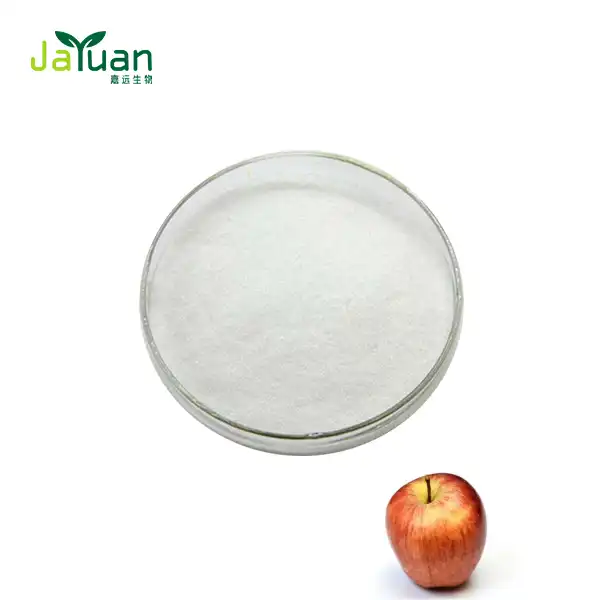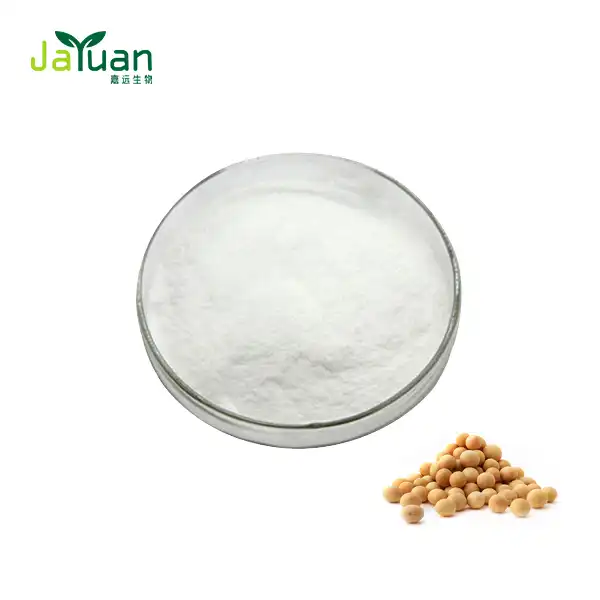The Impact of Genistein Extract on Cardiovascular Health: A Comprehensive Review
Cardiovascular health remains a paramount concern in today's fast-paced world. As we seek natural solutions to support heart function, genistein extract has emerged as a promising candidate. This comprehensive review delves into the potential benefits of genistein for cardiovascular health, exploring its mechanisms of action and the latest research findings.

How Genistein Extract Supports Heart Function
Genistein, a naturally occurring isoflavone found in soybeans and other legumes, has garnered significant attention for its potential cardioprotective properties. This phytoestrogen possesses a unique molecular structure that allows it to interact with various biological pathways, potentially benefiting heart health.
One of the primary ways genistein extract powder supports heart function is through its antioxidant properties. By neutralizing harmful free radicals, genistein helps reduce oxidative stress, a key factor in the development of cardiovascular diseases. This antioxidant activity may help protect the heart's cells and tissues from damage, potentially slowing the progression of heart-related conditions.
Moreover, genistein has demonstrated anti-inflammatory effects, which are crucial for maintaining cardiovascular health. Chronic inflammation is a known contributor to the development of atherosclerosis, a condition characterized by the buildup of plaque in the arteries. By mitigating inflammation, genistein may help prevent the formation of these harmful plaques, thereby supporting overall heart function.
Research has also suggested that genistein may enhance the production of nitric oxide, a molecule that plays a vital role in vasodilation. By promoting the relaxation of blood vessels, genistein could contribute to improved blood flow and reduced strain on the heart, potentially lowering the risk of hypertension and related cardiovascular complications.
Genistein and Blood Pressure: What Research Says
The relationship between genistein and blood pressure has been a subject of intense scientific scrutiny. Several studies have indicated that genistein may have a positive impact on blood pressure regulation, offering potential benefits for individuals at risk of hypertension.
A meta-analysis of randomized controlled trials published in the Journal of Hypertension found that soy isoflavone supplementation, which includes genistein, was associated with a significant reduction in both systolic and diastolic blood pressure. This effect was particularly pronounced in individuals with initial blood pressure readings above 130/85 mmHg.
The mechanisms behind genistein's blood pressure-lowering effects are multifaceted. One proposed pathway involves the activation of endothelial nitric oxide synthase (eNOS), an enzyme responsible for the production of nitric oxide. By enhancing nitric oxide availability, genistein may promote vasodilation and improve endothelial function, both of which contribute to better blood pressure control.
Additionally, genistein has been shown to modulate the renin-angiotensin-aldosterone system (RAAS), a hormonal system that plays a crucial role in blood pressure regulation. By inhibiting the activity of angiotensin-converting enzyme (ACE), genistein may help reduce the production of angiotensin II, a potent vasoconstrictor. This action could further contribute to its blood pressure-lowering effects.
While these findings are promising, it's important to note that more research is needed to fully elucidate the long-term effects of genistein supplementation on blood pressure and overall cardiovascular health. As with any dietary supplement, individuals considering genistein extract for blood pressure management should consult with a healthcare professional before incorporating it into their regimen.
Best Sources of Genistein for Cardiovascular Benefits
For those looking to harness the potential cardiovascular benefits of genistein, there are several dietary and supplemental sources to consider. While genistein extract powder supplements offer a concentrated form of this isoflavone, incorporating genistein-rich foods into your diet can also be beneficial.
Soybeans and soy-based products are among the richest natural sources of genistein. These include: Tofu, Tempeh, Edamame, Soy milk, Miso.
Other legumes, such as chickpeas, lentils, and fava beans, also contain genistein, albeit in lower concentrations than soy. Additionally, some studies have identified genistein in certain types of nuts, particularly pistachios.

For those seeking a more concentrated source, genistein extract supplements are available in various forms, including capsules, tablets, and powders. When choosing a supplement, it's crucial to opt for high-quality products from reputable manufacturers to ensure purity and potency.
It's worth noting that the bioavailability of genistein can vary depending on the source and preparation method. For instance, fermented soy products like miso and tempeh may offer better absorption of genistein compared to non-fermented sources. Similarly, the presence of other compounds in whole foods may enhance or inhibit genistein's absorption and effects.
While incorporating genistein-rich foods or supplements into your diet may offer potential cardiovascular benefits, it's essential to maintain a balanced approach. A heart-healthy lifestyle that includes regular exercise, stress management, and a varied diet rich in fruits, vegetables, and whole grains remains the cornerstone of cardiovascular health.
In conclusion, the growing body of research on genistein's impact on cardiovascular health is encouraging. From its potential to support heart function and regulate blood pressure to its antioxidant and anti-inflammatory properties, genistein offers a promising natural approach to heart health. As we continue to unravel the complexities of this remarkable isoflavone, it may play an increasingly important role in preventive cardiovascular care.
Are you interested in exploring high-quality genistein extract powder for your products or research? Xi'an Jiayuan Bio-Tech is committed to providing premium plant extracts backed by rigorous quality control and scientific expertise. Contact us at sales@jayuanbio.com to learn more about our genistein products and how they can benefit your cardiovascular health initiatives.
References
- Liu XX, Li SH, Chen JZ, et al. Effect of soy isoflavones on blood pressure: A meta-analysis of randomized controlled trials. Nutr Metab Cardiovasc Dis. 2012;22(6):463-470.
- Siow RC, Li FY, Rowlands DJ, de Winter P, Mann GE. Cardiovascular targets for estrogens and phytoestrogens: transcriptional regulation of nitric oxide synthase and antioxidant defense genes. Free Radic Biol Med. 2007;42(7):909-925.
- Squadrito F, Altavilla D, Morabito N, et al. The effect of the phytoestrogen genistein on plasma nitric oxide concentrations, endothelin-1 levels and endothelium dependent vasodilation in postmenopausal women. Atherosclerosis. 2002;163(2):339-347.
- Verdrengh M, Jonsson IM, Holmdahl R, Tarkowski A. Genistein as an anti-inflammatory agent. Inflamm Res. 2003;52(8):341-346.
- Yanagihara N, Zhang H, Toyohira Y, et al. New insights into the pharmacological potential of plant flavonoids in the catecholamine system. J Pharmacol Sci. 2014;124(2):123-128.
- Zhang Y, Chen WF, Lai WP, Wong MS. Soy isoflavones and their bone protective effects. Inflammopharmacology. 2008;16(5):213-215.




